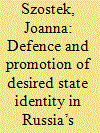| Srl | Item |
| 1 |
ID:
164304


|
|
|
|
|
| Summary/Abstract |
The paper reports findings from a focus group study on representations of Europe, conducted in England in the run-up to the UK EU referendum. Four themes were identified in the analysis: ‘cultured Europe’; ‘little Europe/global Britain’; ‘Europe as a cultural threat’; and ‘Eastern vs. Western Europe’. Analysis of these themes showed that Europe was an ambivalent identity category that could encapsulate contrary ideas such as cosmopolitanism/isolationism and cultural enrichment/undermining. Europe’s relation to Britain was also ambivalent in the data. Britain could be positioned as superior to Europe, sometimes being seen as closer to the ‘European essence’ in the context of the EU’s eastward expansion, which was seen as diluting European culture. But, Britain could also be seen as backward compared to the idea of cosmopolitan continental Europe. These different lines of argument and their ideological underpinnings are explored in the discussion of the findings.
|
|
|
|
|
|
|
|
|
|
|
|
|
|
|
|
| 2 |
ID:
155456


|
|
|
|
|
| Summary/Abstract |
This article examines how the Russian state promotes and protects its preferred self-identity, using the conceptual framework of ‘strategic narrative’. Nation branding practices, including state-funded ‘mega-projects’ like the Sochi Olympics, have contributed to the narrative by characterising Russia as a welcoming, attractive destination. However, a more salient feature of Russia’s strategic narrative is intense ‘anti-Western’ and ‘anti-American’ political and media discourse, formulated to defend against rival, threatening narratives projected from other countries. Through analysis of official statements and state television content, this article demonstrates how determination to protect ‘great power’ and ‘European’ identities underlay Russia’s strategic narrative in 2014. It considers responses which the narrative has prompted, arguing that desired results in domestic reception have been achieved at the expense of unsatisfactory results internationally. Heavy-handed attacks on the identities of other states boost collective self-esteem among Russian citizens, but they fail to produce – and arguably obstruct – desired responses among foreign audiences.
|
|
|
|
|
|
|
|
|
|
|
|
|
|
|
|